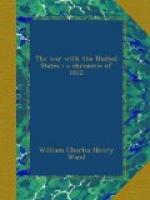At this precise moment Drummond dashed up and drew rein. There was not a minute to lose. The leading Americans were coming on in excellent order, only a musket-shot away; Pearson’s thousand were just in the act of giving up the key to the whole position; and Drummond’s eight hundred were plodding along a mile or so in rear. But within that fleeting minute Drummond made the plan that brought on the most desperately contested battle of the war. He ordered Pearson’s thousand back again. He brought his own eight hundred forward at full speed. He sent post-haste to Colonel Scott to change once more and march on Lundy’s Lane. And so, by the time the astonished Americans were about to seize the key themselves, they found him ready to defend it.
Too long for a hillock, too low for a hill, this key to the whole position in that stern fight has never had a special name. But it may well be known as Battle Rise. It stood a mile from the Niagara river, and just a step inland beyond the crossing of two roads. One of these, Lundy’s Lane, ran lengthwise over it, at right angles to the Niagara. The other, which did not quite touch it, ran in the same direction as the river, all the way from Fort Erie to Fort George, and, of course, through both Chippawa and Queenston. The crest of Battle Rise was a few yards on the Chippawa side of Lundy’s Lane; and there Drummond placed his seven field-guns. Round these guns the thickest of the battle raged, from first to last. The odds were four thousand Americans against three thousand British, altogether. But the British were in superior force at first; and neither side had its full total in action at any one time, as casualties and reinforcements kept the numbers fluctuating.
It was past six in the evening of that stifling 25th of July when Winfield Scott attacked with the utmost steadiness and gallantry. Though the British outnumbered his splendid brigade, and though they had the choice of ground as well, he still succeeded in driving a wedge through their left flank, a move which threatened to break them away from the road along the river. But they retired in good order, re-formed, and then drove out his wedge.




